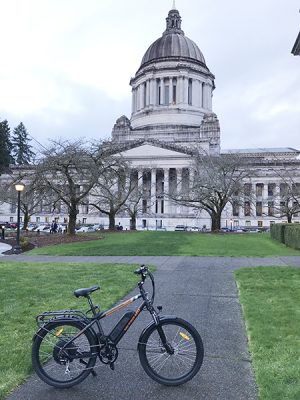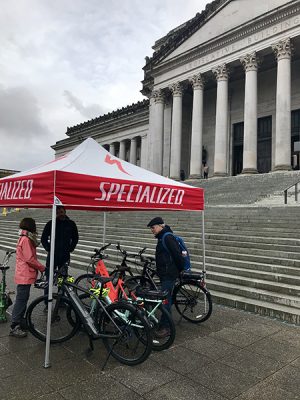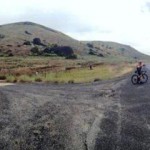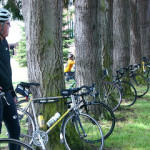 Week 4 saw several advances for the 2018 Washington Bikes Agenda.
Week 4 saw several advances for the 2018 Washington Bikes Agenda.
After three weeks of laying groundwork, meetings and productive conversations to advance some of Washington Bikes 2018 priorities, week 4 of the 2018 legislative session brought a host of committee hearings on legislation – mostly good and a little bad – for people who bike.
E-Bike Day in Olympia!
Washington Bikes’ priority legislation – to update electric-assist bicycle (e-bike) laws – were heard in Senate and House Transportation committees Wednesday, January 31.
The e-bike industry has taken off in recent years, with e-bike sales up more than 450% since 2013, according to The NPD Group. As the e-bike industry has been fast to innovate and grow, current state law pertaining to e-bikes is outdated. SB 6434/HB 2782 will update Washington state e-bike laws to national standards and provide certainty for manufacturers, retailers and consumers. Arkansas, California, Colorado and others have already implemented this legislative update.
Additionally, in partnership with Raleigh Electric and Old Town Bicycle of Olympia, Washington Bikes hosted an e-bike demonstration in front of the capitol. Legislators, staff and lobbyists all got a chance to check out and ride around on an assortment of e-bikes.
House and Senate bills were heard in their respective transportation committees with compelling testimony from job creators like Rad Power Bikes, a mother who transports who two young children on her e-bike, as well as trail users.
State Senate Majority Leader Sharon Nelson, an e-bike owner herself, testified on behalf of the legislation, noting, “you get a great workout and can go on hills that previously were daunting. This [e-bike] can change your life!”
Both bills are scheduled for executive session prior to the February 7 fiscal committee cutoff.
Strengthening Washington’s vulnerable user law
A late addition to Washington Bikes’ 2018 legislative agenda is legislation that strengthens the 2011 Vulnerable User Law.
This vulnerable user bill (HB 2900) is exciting and important because since its passage in 2011, funding for the education of prosecutors and law enforcement of the vulnerable user law has been limited and oftentimes non-existent. This new legislation seeks to change that so that families and individuals who suffer from traffic violence can seek justice.
HB 2900, sponsored by Representative Kilduff, would strengthen the penalties given for specific traffic infractions involving a vulnerable user. The fines collected would be deposited into a vulnerable user education account that would go towards educating law enforcement, prosecutors and judges to educate them about how to enforce Washington’s vulnerable user laws.
Washington Bikes testified against using multimodal funds to incentivize transportation that isn’t multimodal
HB 2653 funds electric vehicle sales tax incentives. Washington Bikes position on the legislation is not about the content of the legislation, but instead based on the funding mechanism that takes money from the state’s multimodal transportation account, and spends it on vehicles that do not fit the larger definition of what multimodal transportation is. Washington Bikes holds that this limited funding source should remain dedicated to funding modes other than cars.
WA Bikes testified opposed to HB 2653 along with a coalition of multimodal partners, including the Safe Routes to School National Partnership, Feet First, Futurewise, the Washington State Transit Association and Transportation Choices Coalition.
Already, demand outstrips the supply for limited Multimodal Transportation Account funds that support Safe Routes to School projects (sidewalks to schools and trails) and programs, as well as bicycle/pedestrian safety projects. Additionally, projects that grow transit, including Regional Mobility Grants, in the state also receive valuable funding from the Multimodal Transportation Account.
If there is money to be spent in the multimodal account, it should be spent buying down more of these active transportation grant program lists. HB 2653 moved out of the Transportation committee last week and has been referred to the Finance Committee.
Check back for updates from the 2018 legislative session!



